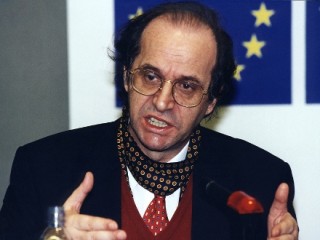
Ibrahim Rugova biography
Date of birth : 1944-12-02
Date of death : 2006-01-21
Birthplace : Cerrcë, Kosovo
Nationality : Albanian
Category : Politics
Last modified : 2011-09-13
Credited as : politician, first President of Kosovo, LDK
1 votes so far
Rugova came from a village called Cerrcë in Kosovo, a province in southern Serbia. Kosovo was home to a large population of ethnic Albanians from neighboring Albania, with Rugova's family among them. He was born in 1944, during the height of World War II, a conflict that played out in Kosovo as a battle between Nazi German troops, who occupied the area after 1943, and a pro-Communist militia known as the Partisans. The Partisans were led by Josip Broz Tito, who after the war united the various Balkan territories including Serbia into a federation called Yugoslavia. Before the war's end, however, Rugova's father and grandfather were captured by Partisan fighters and executed for allegedly siding with the Germans.
Rugova spent the majority of his life under Communist rule, as Yugoslavia was under Tito. After he finished high school in Peja, he went on to the newly established University of Pristina, from which he earned a degree in Albanian studies in 1971. He embarked upon a second course of study that same year, literary theory, at the same university, and eventually edited the student newspaper and literary journal. In the mid-1970s, he traveled to France for further study at the Sorbonne in Paris, some of it under renowned literary critic Roland Barthes. He earned his doctorate in 1984 after completing a dissertation on the history of Albanian literary criticism.
Already active in his field in the 1970s, Rugova became a member of the Communist Party, a necessity for anyone who hoped for professional advancement in Yugoslavia during this era. He held positions with the Institute for Albanian Studies, edited its journal, and eventually secured a professorship at the University of Pristina. He expected to spend his career in academia, but was drafted into politics in the late 1980s when Kosovo which had enjoyed a certain degree of autonomy in the last 25 years was targeted by new Serbian leader Slobodan Milosevic. Albanians were fired from civil-service jobs in the province, for example, and a proposed new change in the constitution would have revoked Kosovo's autonomous status.
Kosovo's educated, middle-class citizens led the opposition to these changes, and Rugova was among them. He signed an Appeal of Kosovo Intellectuals against the constitutional proposal, and was expelled from the Communist Party for it. In December of 1989 he and several others met and formed Kosovo's first political party, the Democratic Alliance of Kosovo (LDK), and Rugova was elected to lead it. The group signified a new political shift in Kosovo, and heralded the beginning of the Kosovo Albanian independence movement; prior to this time, any talk of autonomy had been Marxist in tone and focused on reunification with Albania.
The LDK issued a declaration of Kosovo's independence in 1990, and urged Kosovo Albanians to challenge Serb rule via nonviolent resistance, including the boycotting of elections. In separate, unauthorized balloting, Rugova was elected president of a theoretical Kosovo, and went on to oversee an entire shadow government, including a legislative assembly that met in Germany. Others in Kosovo believed a call to arms was in order, and the Kosovo Liberation Army (KLA) emerged to mount an armed resistance to Serb domination and abuse. In 1997 the KLA went on the offensive, and a vicious battle began, which claimed Serb troops as well as scores of civilians in Kosovo. KLA commanders supplanted Rugova as the new leaders in the independence movement, and Rugova was widely criticized for appearing alongside Milosevic in the spring of 1999 on television to urge a political solution when North Atlantic Treaty Organization (NATO) planes began bombing Serb military targets in an effort to oust them.
The NATO effort was successful, and United Nations troops moved into the area as peacekeepers. Rugova's LDK did well in the first regional elections in Kosovo in 2000, and in March of 2002 he was elected to the presidency by the Kosovo Assembly. His political goal was a free, independent Kosovo, and he was always seen in public with his trademark red scarf, which he declared he would only stop wearing when Kosovo was fully liberated. There were still tensions between the LDK and KLA, but Rugova had named one of the top commanders in the 199799 conflict, Ramush Haradinaj, as his prime minister in 2004 in an effort to promote national unity. There were UN talks scheduled for February of 2006, in which Rugova was expected to successfully argue the case for a self-governing Kosovo free from United Nations oversight, but he was diagnosed with lung cancer in the summer of 2005. He died in Pristina on January 21, 2006, at the age of 61, and is survived by his wife, Fana, and their three children. In his last public appearance a month earlier, Rugova had told a the crowd, "The only thing we did not achieve this year is independence for Kosovo," according to his Washington Post obituary by Daniel Williams, "but we will have it in 2006."
















